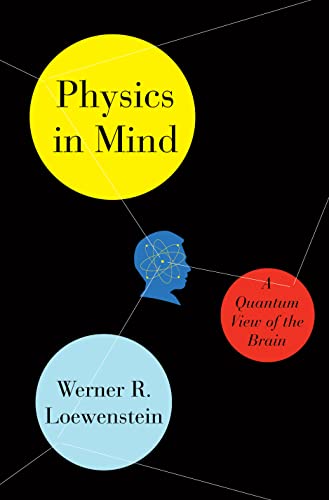
Synopsis
No one can escape a sense of awe when reflecting on the workings of the mind: we see, we hear, we feel, we are aware of the world around us. But what is the mind? What do we mean when we say we are "aware" of something? What is this peculiar state in our heads, at once utterly familiar and bewilderingly mysterious, that we call awareness or consciousness?
In Physics in Mind, eminent biophysicist Werner R. Loewenstein argues that to answer these questions, we must first understand the physical mechanisms that underlie the workings of the mind. And so begins an exhilarating journey along the sensory data stream of the brain, which shows how our most complex organ processes the vast amounts of information coming in through our senses to create a coherent, meaningful picture of the world. Bringing information theory to bear on recent advances in the neurosciences, Loewenstein reveals a web of immense computational power inside the brain. He introduces the revolutionary idea that quantum mechanics could be fundamental to how our minds almost instantaneously deal with staggering amounts of information, as in the case of the information streaming through our eyes.
Combining cutting-edge research in neuroscience and physics, Loewenstein presents an ambitious hypothesis about the parallel processing of sensory information that is the heart, hub, and pivot of the cognitive brain. Wide-ranging and brimming with insight, Physics in Mind breaks new ground in our understanding of how the mind works.
"synopsis" may belong to another edition of this title.
About the Author
Werner R. Loewenstein was professor of physiology and biophysics at Columbia University and director of its Cell Physics Laboratory. Author of The Touchstone of Life, he lives in Woods Hole, on Cape Cod, Massachusetts.
Reviews
*Starred Review* Was Leibniz wrong? The German philosopher once declared that science would never explain the human mind. His assertion hangs in the balance when Loewenstein illuminates the enigma of thought. Defying the usual disciplinary boundaries, Loewenstein deploys a Darwinian physics (replacing the daunting mathematics with clear bioneurological narrative, laced with sprightly humor) to explain how the cosmic volley of information arrows loosed by the Big Bang set the course for evolution. Readers will marvel at the electrochemical cunning of the chlorophylls and carotenes, cellular proteins and ion-selective membranes, that convert quantum signals carried by photons and electrons into life codes governing all multicellular organisms, all while satisfying the inflexible demands of thermodynamics. Astonishment swells again as readers contemplate the time structure of macromolecules, shaping the brain’s neuron trellis into a parallel quantum biocomputer. That biocomputer has given one peculiar species a mind’s-eye capacity for surveying the world as a whole and for anticipating future events in that world. It may disappoint some readers that, having come so far in explaining mental functions, Loewenstein finally balks before “the mystery of mysteries”—consciousness itself. Somewhere the shade of Leibniz breathes a sigh of relief. But Loewenstein will be back. And readers will be eager to join him. --Bryce Christensen
"About this title" may belong to another edition of this title.
Search results for Physics in Mind: A Quantum View of the Brain
Physics in Mind: A Quantum View of the Brain
Seller: Bellwetherbooks, McKeesport, PA, U.S.A.
hardcover. Condition: Very Good. Very Good Condition - May show some limited signs of wear and may have a remainder mark. Pages and dust cover are intact and not marred by notes or highlighting. Seller Inventory # PR-HC39-VG-0465029841
Physics in Mind : A Quantum View of the Brain
Seller: Better World Books, Mishawaka, IN, U.S.A.
Condition: Good. 0th Edition. Former library book; may include library markings. Used book that is in clean, average condition without any missing pages. Seller Inventory # 4212106-6
Physics in Mind : A Quantum View of the Brain
Seller: Better World Books, Mishawaka, IN, U.S.A.
Condition: Good. 0th Edition. Used book that is in clean, average condition without any missing pages. Seller Inventory # 572883-6
Physics in Mind : A Quantum View of the Brain
Seller: Better World Books: West, Reno, NV, U.S.A.
Condition: Good. 0th Edition. Former library book; may include library markings. Used book that is in clean, average condition without any missing pages. Seller Inventory # 4212106-6
Physics in Mind : A Quantum View of the Brain
Seller: Better World Books, Mishawaka, IN, U.S.A.
Condition: Very Good. 0th Edition. Former library book; may include library markings. Used book that is in excellent condition. May show signs of wear or have minor defects. Seller Inventory # 4681465-6
Physics in Mind: A Quantum View of the Brain
Seller: Seattle Goodwill, Seattle, WA, U.S.A.
hardcover. Condition: Good. Seller Inventory # mon0000111227
Physics in Mind
Seller: ThriftBooks-Dallas, Dallas, TX, U.S.A.
Hardcover. Condition: Good. No Jacket. Pages can have notes/highlighting. Spine may show signs of wear. ~ ThriftBooks: Read More, Spend Less. Seller Inventory # G0465029841I3N00
Physics in Mind
Seller: ThriftBooks-Dallas, Dallas, TX, U.S.A.
Hardcover. Condition: Very Good. No Jacket. May have limited writing in cover pages. Pages are unmarked. ~ ThriftBooks: Read More, Spend Less. Seller Inventory # G0465029841I4N00
Physics in Mind
Seller: ThriftBooks-Atlanta, AUSTELL, GA, U.S.A.
Hardcover. Condition: Good. No Jacket. Pages can have notes/highlighting. Spine may show signs of wear. ~ ThriftBooks: Read More, Spend Less. Seller Inventory # G0465029841I3N00
Physics in Mind
Seller: ThriftBooks-Atlanta, AUSTELL, GA, U.S.A.
Hardcover. Condition: Good. No Jacket. Missing dust jacket; Pages can have notes/highlighting. Spine may show signs of wear. ~ ThriftBooks: Read More, Spend Less. Seller Inventory # G0465029841I3N01
